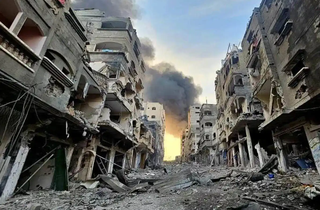The ceasefire proposal, currently under scrutiny, lacks clarity on who would be allowed to return north and how this decision would be made, raising concerns among Hamas representatives. Additionally, Hamas is advocating for amendments to exclude fighters from being barred from returning to northern Gaza, arguing that such a provision could empower Israel to restrict Palestinians' homecomings.
Central to Hamas's stance is the demand for an "unconditional" return of displaced individuals and a clear commitment to a full withdrawal of Israeli troops from Gaza. While Hamas has shown flexibility towards Israel's proposal for a gradual withdrawal, it insists on the ultimate goal of a complete withdrawal.
The proposed plan outlines a phased withdrawal of Israeli forces from key areas in Gaza, starting with the Netzarim corridor and progressing towards the east of Salah Al-Din Street. Hamas is currently evaluating the proposal, which also includes a 40-day cessation of Israeli attacks and an exchange of captives, with a larger number of Palestinian prisoners set to be released.
International mediators, including Egypt, Qatar, and the United States, are actively engaged in facilitating negotiations between Israel and Hamas. Egypt's proposed one-year ceasefire plan encompasses the withdrawal of Israeli troops, the release of captives, and the repatriation of deceased individuals, aiming for a restoration of sustainable calm.
Despite efforts to reach a ceasefire agreement, the threat of a potential ground invasion by Israeli forces in Rafah, southern Gaza, looms large, prompting widespread concern over the humanitarian repercussions. UN humanitarian chief Martin Griffiths has warned against the devastating impact of such an invasion, particularly in Rafah, which is home to over half of Gaza's population, most of whom are displaced individuals seeking refuge from Israeli attacks.
Since the onset of the Israeli genocide on October 7th, casualties have continued to rise, with over 34,000 people killed and more than 77,000 injured. The Israeli genocidal war has caused extensive damage to Gaza's infrastructure and forced the majority of its residents to flee their homes. (ILKHA)



 Güncel
Güncel
 Röportaj
Röportaj
 Dünya
Dünya
 Dünya
Dünya
 Güncel
Güncel
 Güncel
Güncel
 Güncel
Güncel
 Güncel
Güncel
 Dünya
Dünya
 Güncel
Güncel





